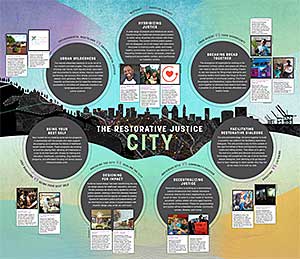The Restorative Justice City

The Restorative Justice City
From Punitive to Restorative Justice
[Featured in the Urban Institute report, Exploring the Ways Arts and Culture Intersect with Public Safety]
Prisons and the criminal economy offer the same purpose: they absorb marginalized people who are systematically left out of the mainstream and the legitimate economy. They absorb the excess human capacity that traditional institutions including schools and employers can’t, or won’t. While prisons turn humans into “idle assets,” the criminal economy turns them into productive members, for better or for worse.
 Through a complex ecosystem, today’s criminal justice system makes it near impossible for up to 7 million Americans to access the legitimate economy, systematically trapping more and more people inside prisons and the criminal economy.
Through a complex ecosystem, today’s criminal justice system makes it near impossible for up to 7 million Americans to access the legitimate economy, systematically trapping more and more people inside prisons and the criminal economy.
2015 has been a landmark year for exposing the cracks in America’s criminal justice system and starting the conversation about reform. The deaths of unarmed men Eric Garner, Michael Brown, and Ezell Ford at the hands of police sparked the Black Lives Matter movement and put a global spotlight on the inequality pervasive in America’s policing and prison system.
But where do we go from here? How do we push forward towards real change in our criminal justice system?
While some transformation is underway, we lack a systematic approach that links piecemeal innovations into a coherent process of positive transformation. The Restorative Justice City map is an attempt to reimagine the urban landscape through a restorative lens, bringing people out of prisons and the criminal economy, into productive and useful work in the service of their own communities. If executed well, we’ll unlock critical untapped human potential needed to rebuild our many blighted urban communities.
What would it take to transform your city’s criminal justice system?
Join us to reimagine and rebuild your criminal justice system through participatory and inclusive approaches that begin by simply asking, what is possible?
Related Research
More Information
For more information about this research:
- CONTACT: Tessa Finlev | tfinlev@iftf.org
- CONTACT: Deanna Van Buren | dvanburen@fourmdesign.com
- FOLLOW: #RJCity + @IFTF



